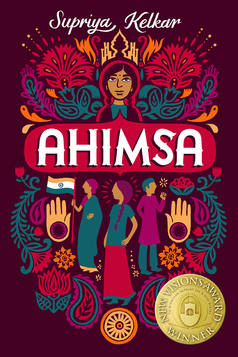Ahimsa
Review
By Foreword Reviews
Writing is youthful yet complex, and includes wonderful descriptions of India.
Ahimsa is the story of a young Indian girl, Anjali, whose mother has just joined 1942’s freedom movement, upending her whole world and changing her perspective. Anjali is at the top of the caste system, though her parents are of the rare opinion that those lower in the system are not lesser than they are. Anjali’s best friend, Irfaan, is Muslim—another rarity, in a time of conflict between Muslims and Hindus. These factors help to set the groundwork for Anjali’s coming activism. Anjali’s life is already different. Her mother quit her job working for a British officer to join the freedom movement, which is dedicated to equality in India—no more castes. Difficulties come; both Anjali and her mother struggle with the opinions of others in lower and upper castes, as well as the threat of the law. At ten years old, Anjali’s perspective is rendered well. She is not necessarily mature yet, but she is a happy, insightful girl. When problems arise, she is brave but also reacts realistically. Fights among her peers and issues within the freedom movement make her scared and often confused, but she does not abandon her values or beliefs. Anjali admirably adapts to new ideals, as when a friend in the lower caste system informs her that one of the movement’s actions is actually hurtful; she listens and changes for the better. The writing reflects Anjali’s age, with a youthful but complex voice. It includes wonderful descriptions of India, paying attention to details such as cuisine and clothes. Time is well plotted, moving along quickly with no skips or awkward pausing. It is almost a surprise to find how much time has passed near the end, since the pace does not slow. This is a story that is both easily enjoyable and hard to put down. Fluid writing and a delightful, realistic point of view make Ahimsa an enjoyable period piece for young adults.
Reviews & Comments
School Library JournalBooklist
Padma Venkatraman, author of THE BRIDGE HOME
Uma Krishnaswami, author of STEP UP TO THE PLATE, MARIA SINGH
Vidhu Vinod Chopra, director of the films 1942: A LOVE STORY and EKLAVYA: THE ROYAL GUARD
Rajkumar Hirani, director of the films 3 IDIOTS, PK, and LAGE RAHO MUNNABHAI
Publishers Weekly
Kirkus Reviews







